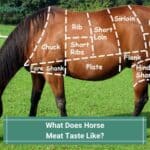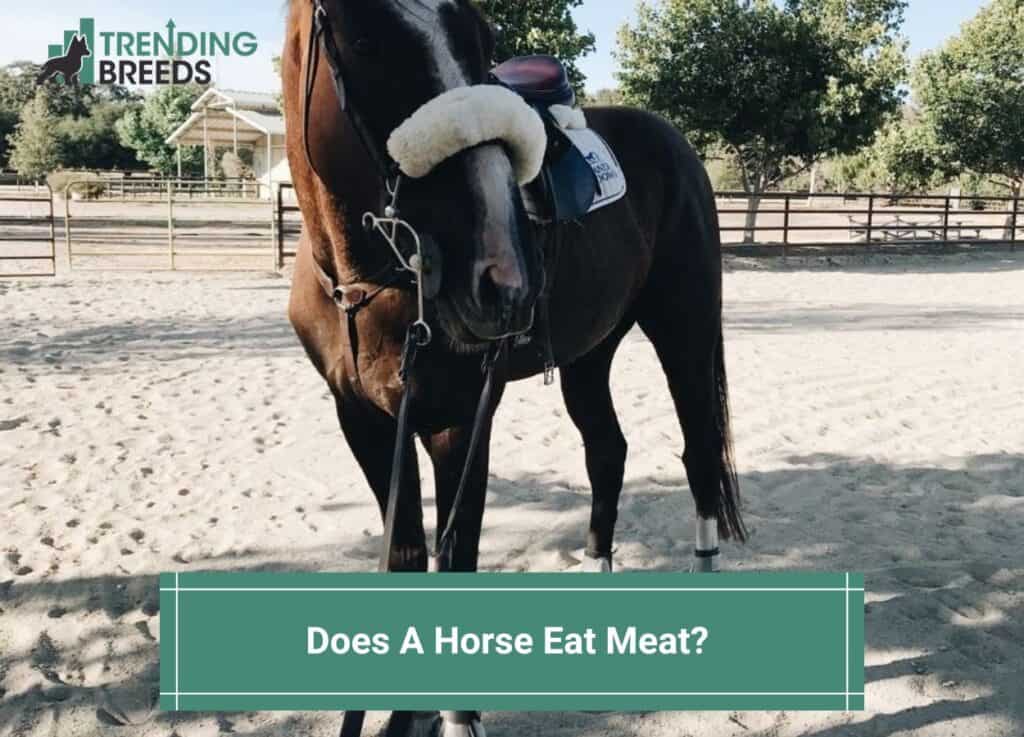
Although commonly loved by many people around the world, there is not much known about horses. There are many questions about them that people often have no answer to. For example, does a horse eat meat?
Well, not primarily. A horse mainly eats plants and is a herbivore. However, just like any other creature on the planet, his diet may include meat under extreme circumstances.
There are also some exceptional cases where horses have grown a liking towards meat.
Keep reading below for more information.
Before you scroll further down this guide, check out these other horse-related articles: Best Horse Rescues in Ontario and Best Horse Rescues in North Carolina.
Table of Contents
Do Horses Eat Meat?
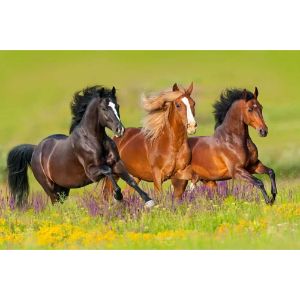
Horses are classified as herbivores. They are delicate beings with digestive systems designed to consume plant-based foods, not meat.
It’s important to remember that horses can’t throw up, so a buildup of molds and poisons in their stomachs can be lethal.
Consuming small amounts of meat probably isn’t going to cause any problems, but eating too much of it could.
The vast majority of cases where horses have been reported to eat meat involve human intervention. Meat and fish are often disguised as other ingredients.
It’s possible that the salt in the Icelandic dried fish is what the horses really enjoy, rather than the fish itself. Even though horses can eat meat and fish, there’s no proof that they voluntarily do so.
Do Wild Horses Eat Meat?
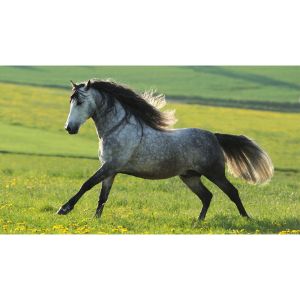
To begin, it’s important to note that horses are not a carnivorous species.
They frequently congregate in large groups, not so that they can feast on the meat of large creatures that have died, but rather so that they can protect themselves from the attacks of larger predators such as big cats, bears, and alligators.
It is ,therefore, quite unlikely that you will come across a herd of wild horses consuming the flesh of a recently deceased creature.
On occasion, though, wild horses may consume prey that is smaller than themselves, including birds and rodents.
They might even use such creatures as sport, catching and playing with them before devouring them.
Hunger and the drive to survive are likely the driving forces behind the behavior of wild horses, who have been observed to consume the meat of smaller animals.
Horses might try meat just to see what it tastes like. In the wild, finding fresh foods can be challenging, but they have easy access to a wide variety of greens.
However, the fact that they opted to eat the meat of small animals suggests that they did so either out of an insatiable curiosity or because they just liked the smell and taste of the meat.
What to Feed Horses
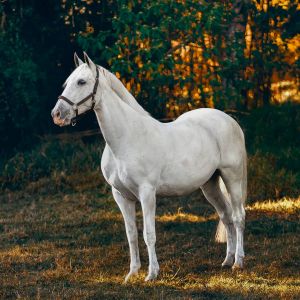
Hay and grass are the staple foods for horses. However, to ensure your horse’s optimal health, you must provide them with a variety of foods.
Fruits are a healthy treat that your horses will appreciate every once in a while.
Fruits are a foolproof way to win a horse’s affection. Carrots, oranges, peanuts, mango, beets, apples, pineapple, coconut, bananas, lemons, berries, and sweet potatoes are all excellent options for a tasty snack.
In addition, if you want a wild horse to quit being afraid of you and act friendly instead, approach it from the front while holding a piece of fruit in your hand.
This sends them a message of security and helps reduce the stress associated with being in an unfamiliar environment.
The Anatomy of a Horse’s Digestive System
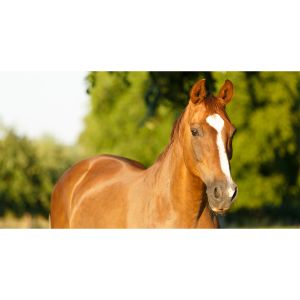
Domesticated or not, wild horses rarely seek out meat as their main source of nutrition. Horses are naturally vegetarians, and their digestive systems function best on plant-based diets.
When you examine the stomach of a horse, you will notice that its intestines are quite enormous and quite lengthy. This is due to the fact that the body needs more time to digest plant material before it can absorb all of the nutrients contained within it.
If you compare this with the digestive system of a carnivore, you’ll notice that the stomachs of carnivores are smaller, and their intestines are more condensed. This is because carnivores specialize in eating meat.
Because of this, the meat in a meal needs to be digested and eliminated from the body more quickly.
Meat eaters, or carnivores, have a special liver that processes and eliminates harmful chemicals from the meat they consume. The livers of horses are incapable of performing that necessary function.
The Defining Role of Horse Teeth
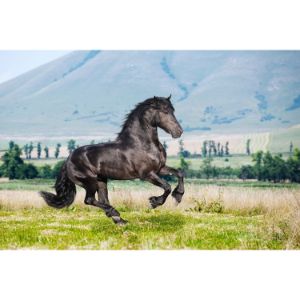
Horses’ teeth also set them apart from more common meat-eaters. Horses, unlike carnivores, have flat, molar-like teeth designed for pounding and chewing as opposed to shredding and cutting.
Horses do not have the pointed canine teeth that are typical of mammals because they are herbivores and do not need to consume meat.
Horses have 36 teeth total: twelve incisors for cutting plant matter, twelve premolars for breaking down tougher plant parts, and twelve molars for grinding everything down to a fine powder.
The Process of Digestion

Grazing animals thrive on a diet that requires a tiny stomach. Since they take so long to digest their food, they only need to store a minimal amount of it.
While it may be the smallest part of the digestive tract, the horse’s stomach is just the beginning of the digestive process.
And unlike humans, horses can’t throw up. This puts them at risk for terrifying problems in the event that they consume any meat that is spoiled or difficult to digest for whatever reason.
Grass, on the other hand, does not spoil. Vomiting allows meat eaters to rid their bodies of harmful or unpleasant food before it causes any problems.
Horses also don’t have a gallbladder. Their natural diet of grasses is low in fat, so they haven’t evolved to deal with it. A horse may adapt to up to 20% more fat in their diet, but this change requires time.
Nutritional Requirements of a Horse
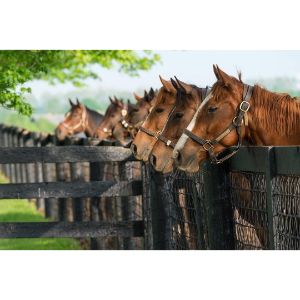
A horse requires a large amount of food. If a horse weighs 1,000 pounds, it needs 13,500 calories a day to stay the same size.
The consumption of as many as 16,200 additional calories on a daily basis is possible when they enhance their routine to include additional jumping as well as more strenuous exercise and training.
In general, greens have few calories. Grazing on pasture grass only gives something in the range of 266 to 308 calories per pound.
Additions to a horse’s diet, such as grains, sweet feeds, hay, and more, are necessary for optimal health.
Roughage is a horse’s primary source of nutrition. Additionally, a significant amount of water can be stored in hay and grass.
It is estimated that pasture grass is composed of about 70% water. Consequently, the majority of the horse’s digestive capacity is taken up by these types of food.
Situations Where Horses May Eat Meat
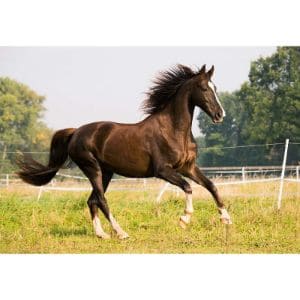
It is only natural for horses to consume vegetarian diets.
However, there are situations in which horses are fed or attempt to voluntarily consume meat products. Let’s talk about the different reasons why horses may decide to eat meat.
Extra Nutrition
Supplements in the form of beef gelatin and bone meal are occasionally given to horses by their owners. This practice is especially prevalent among horse owners in Europe and the United States.
These foods are not given to the horses on their own, but rather are mixed in with their regular feed to enhance the amount of protein and fat the horses consume and promote healthier hoof growth.
Extreme Conditions

Horses are given meat over the long, cold winter months to boost their protein intake and keep them healthy. Dried fish is a popular addition to the diet of horses in Iceland.
Similarly, Tibetan horses are given a diet of both grain and blood. The inclusion of meat in the horses’ diet helps them endure the unrelenting cold of such hostile regions, even if they are not fed a wholly carnivorous diet.
Salty Taste
It’s not uncommon to find horses helping themselves to a taste or two of their owners’ cheeseburgers. The salty flavor of the flesh, however, is said to be what the horse really wants.
Horses have an insatiable need for the minerals they can get from a salt lick.
Therefore, if they watch their owners eating their burgers or other meat items, they conclude that the meal must be edible and attempt to grab it for themselves.
Natural Curiosity
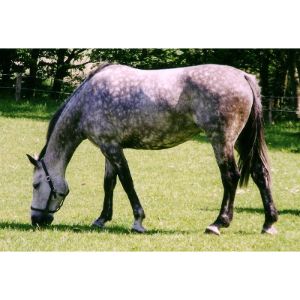
Horses may become fascinated by cheeseburgers if they observe their owners fawning over and devouring them.
They may even try meat for the first time out of curiosity if their human acquaintance tries to feed them some.
Last Resort
Horses in desperation are remarkably flexible creatures. It’s not out of the question that they would try to consume meat if they were desperately hungry.
Almost all animals will eat whatever is around them if they need to survive, and this is a behavior that has evolved over millions of years.
Why Does My Horse Like Meat?
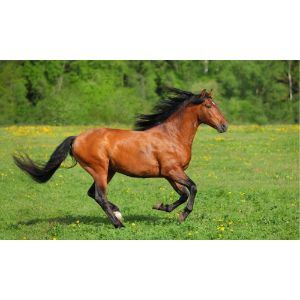
As was covered in an earlier section, horses are supposed to adhere to a vegetarian diet according to their biological make-up.
However, if your horse enjoys eating meat, you need to keep in mind that exceptions can be found in every situation and that behavioral omnivory is a phenomenon that is frequently observed in herbivores.
There’s no reason to freak out if your horses show an interest in meat.
In fact, it’s not uncommon to find that horses can’t resist the tempting aroma and taste of processed foods that feature meat.
Even humans are attracted to the allure of unhealthy fast food due to its appealing flavor, sauces, seasonings, and aroma.
If your horses decide to help themselves to your meaty burger, a hot dog, or whatever else you left behind for them, it’s likely not a huge concern. Horses are known to be opportunistic eaters.
Horses can eat small amounts of meat on occasion without developing serious digestive problems.
Horses’ digestive systems are designed to naturally eliminate any pieces of meat that they are unable to break down.
The fact that your horse likes to consume meat is not, however, evidence that you need to give it a carnivorous diet.
Horses can suffer from health problems if they are fed meat on a regular basis or if it makes up a significant portion of their diet.
Since horses lack the ability to vomit, any signs of digestive problems may necessitate prompt veterinary attention.
What Happens If a Horse Does Eat Meat?
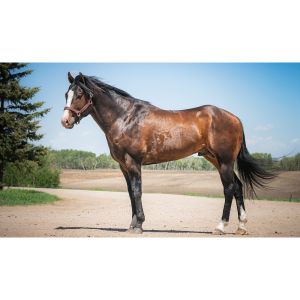
There’s no need to freak out if your domestic horse finds its way into the freezer. It is very likely that your horse can deal with it without any problems whatsoever cropping up.
Horses are large creatures, so feeding them some meat probably won’t hurt them.
This, however, is not a license to be reckless or to intentionally poison them. You should make every attempt to restrict their access to foods containing meat.
Horses are naturally inquisitive, and they will try to steal your lunch if you’re not careful.
Please don’t wait and get in touch with the veterinarian as soon as possible if you notice any adverse effects or problems. When it comes to your horse’s health, you should never take any chances.
Frequently Asked Questions
Can horses eat ice cream?
Horses can’t eat dairy, because they can’t digest the lactose.
Can horses eat cucumbers?
Horses can indeed eat cucumbers. These vegetables are full of vitamins and minerals that benefit horses.
Can horses have McDonald’s fries?
Horses cannot eat fried food. The oil is bad for them.
So Does A Horse Eat Meat?
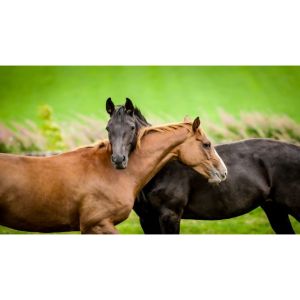
So, although the vast majority of horses are strictly herbivores, you shouldn’t be too surprised if you happen to come across a horse who happens to be eating meat. There are many valid reasons for it to be doing so.
If you find this guide, “Does A Horse Eat Meat,” informative and helpful, you can check out these other horse-related articles from our team:
You can learn more about horses by watching “25 Fun Facts About Horses You Probably Didn’t Know” down below:

